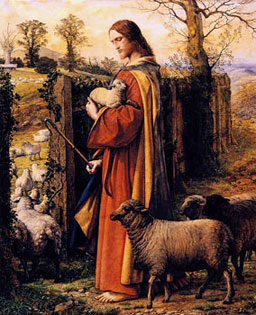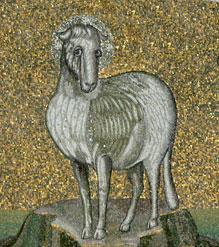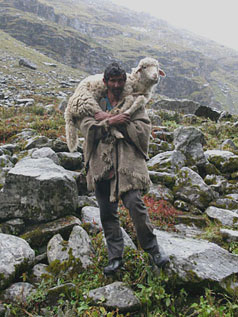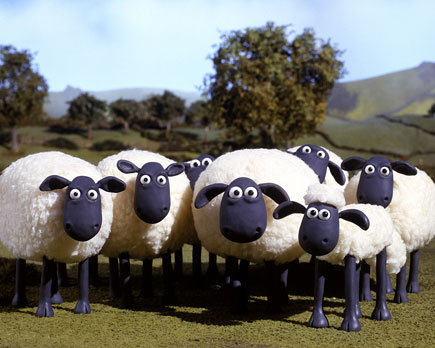
Reflection
by Deborah Beach Giordano
September 16, 2019
What We Don't Know
 This is one of those parables we think we know; you can see it in your mind’s eye: Jesus as the Good Shepherd, the Compassionate One, carrying a lamb back to the safety of the flock. Could anything be cuter than a lamb? Could any action be more endearing? It is charming, heart-warming; definitely an “awwww” moment.
This is one of those parables we think we know; you can see it in your mind’s eye: Jesus as the Good Shepherd, the Compassionate One, carrying a lamb back to the safety of the flock. Could anything be cuter than a lamb? Could any action be more endearing? It is charming, heart-warming; definitely an “awwww” moment.
But the popularity of this tender image has dulled the power of the story behind it. Dazzled by the innumerable — often-saccharine — art representations, we fail to see that the whole event is completely wrong from any reasonable viewpoint. Let us step back for a moment and try to hear the parable as if for the first time.
Jesus begins by saying that a sheep rancher would, of course, leave his flock of ninety-nine sheep on their own while he went off in search of one that was is missing. [Sound of screeching brakes.] Wait a minute. What?? Jesus says this as if it's the most obvious thing in the world, but it is nothing of the sort. Would a responsible sheep owner really abandon the vast majority of his flock; leaving them on their own, in the middle of nowhere, while he goes off to look for a single animal — that may or may not be found?
 Even if, as rendered in my version, the flock is left in open pasture rather than in “the wilderness” as it is usually translated, these ninety-nine are on their own, apparently defenseless, vulnerable to wolves, eagles, and other predators, as well as thieves. So perhaps it is more accurate, as far as the sheep are concerned, to say that they have been left in a desolate wilderness. Outrageous!
Even if, as rendered in my version, the flock is left in open pasture rather than in “the wilderness” as it is usually translated, these ninety-nine are on their own, apparently defenseless, vulnerable to wolves, eagles, and other predators, as well as thieves. So perhaps it is more accurate, as far as the sheep are concerned, to say that they have been left in a desolate wilderness. Outrageous!
As he continued his story, Jesus’ listeners may not have been following along too willingly. Perhaps they’d be frowning in confusion, thinking along practical lines. Why imperil the safety of the rest of the flock for a single sheep? The missing animal could be written off as an acceptable loss — just part of the cost of being in the sheep business. It happens. What was this Jesus talking about?
Perhaps this disengagement of his audience is why the language changes; Jesus goes from saying “you” would search, to speaking of the delight of “the man” who finds the lost sheep and returns, rejoicing. The joy of discovery comes to the one who seeks.
Although it ends Happily Ever After, when seen from any rational angle this is a parable of foolishness; a story of an irresponsible sheep owner who risks all that he has on a potentially futile search for one single animal. With that kind of attitude the fellow wouldn’t be in the sheep business for long.
But Jesus isn’t talking about the sheep business.
He’s talking about the relationship between The One and ones who are missing. He is talking about a Search for what is important — a search conducted by and for the Beloved.
The Missing One
Which brings us to another way that our (perceived) over-familiarity with this story has misled us. We’ve failed to see that lost sheep as it truly is: as a sheep.
The one who was sought-after wasn’t a lamb, not a cuddly little ball of fleece, gentle and trusting — but a full grown adult sheep, its coat gray and matted, reeking of urine, probably frightened, possibly confused and even dangerous. There is no suggestion that it is cute or attractive, but simply lost: out there, somewhere, alone, on its own.
There are all kinds of reasons for a sheep to be lost: it might become entangled in briars, fall into a ravine, be attacked by a predator, or simply wander off. That a mature sheep went missing might indicate that it was sickly or injured, and may have been rejected by the rest of the flock. We don't know for certain.
What we do know is that there is a sheep: one single, solitary sheep, that is missing — and the owner is searching for it.
 Lost for what seems an eternity, our sheep is hungry and thirsty, confused and tired, having no idea which way to turn. Perhaps she has been struggling to find her way back — perhaps the distance was too great, the hill too steep, the path too rocky. Now, her strength exhausted, the sheep awaits the inevitable, lying, panting, in the dirt; staring at the sky as the vultures circle ever lower; too weak to raise a cry. Desolate, alone, all hope abandoned.
Lost for what seems an eternity, our sheep is hungry and thirsty, confused and tired, having no idea which way to turn. Perhaps she has been struggling to find her way back — perhaps the distance was too great, the hill too steep, the path too rocky. Now, her strength exhausted, the sheep awaits the inevitable, lying, panting, in the dirt; staring at the sky as the vultures circle ever lower; too weak to raise a cry. Desolate, alone, all hope abandoned.
Then, life in the midst of death! The master himself is at her side, lifting her up, calling her by name. Carried tenderly, as if a tiny lamb once more, our sheep is brought home, back to the safety of the pasture, to the fresh-flowing stream, to the soft green grasses. Her life is restored — but it is the master who celebrates: what was lost is found.
An Unusual Business
“Yes, well, a lucky break, no doubt.” the Pharisee in our soul grumbles. It is an absurd tale, impossible and wrong-headed in practice: that’s no way to run a sheep ranch.
And that’s exactly right. That is why this a parable and not just a story: it is intended to dislodge our assumptions, disorient our prejudices; to challenge our priorities — in short, to make us think differently. It invites us to look at the world from God’s perspective, not merely our own.
The parable of the lost sheep is told from the Divine perspective. It is not the many, the cumulative mass, the majority that matters most. It is the single one. From among the herd God sees each of us; aware of our vulnerabilities, our strengths and weaknesses, our individuality. It is not the many, but the one that matters.
Seen through the eyes of God: recognized, cherished, beloved, the one is ultimately important — all of us ones: the single and the solitary, the outsiders, the isolated, the excluded, the abandoned, the addicted, the lonely, the lost… All who have strayed or disappeared or been left out are passionately sought-after. For God, the loss of a single soul is unbearable; its restoration a cause for immense delight.
It seems as if, according to the Lord Jesus, if even one is missing, God’s flock is not complete.

May Christ’s grace and healing love abound,
Deborah ✝
Suggested Spiritual Exercise
Understand: you are that one. You are that precious one that God will not ignore or forget — no matter what.
Translation note
My choice of “open pasture” rather than “wilderness” is in agreement with the New American Standard Version translation.